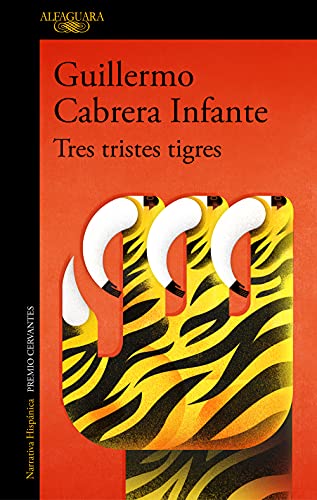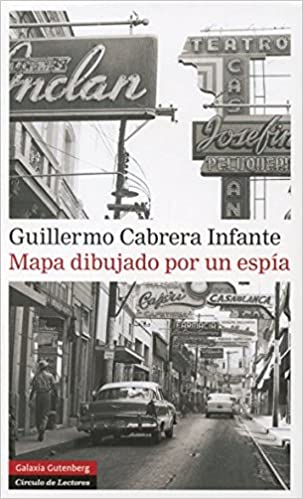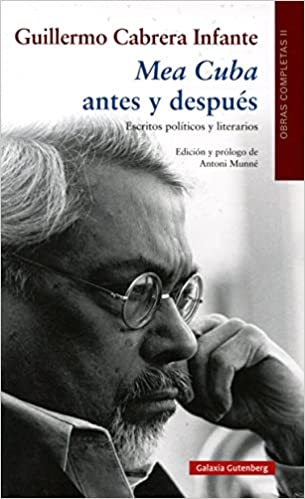As often happens on so many occasions, the exit of William Cabrera Infante of his native country was never an abandonment or a forgetfulness. Circumstances pushed him into exile in Cuba as the only way to escape from a communist regime that he initially supported but which eventually became more of the same with respect to the overthrown dictator Batista. To make matters worse, the story of the Cuban writer was repeated as with Alejo Carpentier in full Machado regime.
Arrived in the Spain of the 60s, despite political differences, the harmony between dictatorial regimes was stronger and neither could he stay here for long in a regular and official way. And he ended up making London his home, in his last condition as an English citizen.
As the highest representative of the Castro dissidence, Cabrera Infante focused part of his work on this rescue of the intra-histories of his homeland lost in the shadows. But there is much more richness in this author.
With his passion for cinema as a creative horizon, his stories had that point of intended histrionics, of overacting like life itself, with its drops of humor, its necessary passions and friendships, its perfect measure of life that ravages by day like most it still bears fruit at night.
Top 3 recommended novels by Guillermo Cabrera Infante
Three sad tigers
TTT according to the acronym used by its own author. The true protagonists of this plot are nostalgia, literature, the city, music and the Havana night.
A perfect compendium for a universe full of nuances that point to the cinematographic from such a prolific sum of intra-stories that converge and spread, that occupy all the space or disappear ... In its form it is not a classic novel because between comings and goings it seems rather that we go through the scenarios on the rails of a camera that capriciously stops to compose its particular mosaic.
As we move into the end of the story, the reflective aspects predominate, such as an explanation by the inhabitants of the place themselves about the universe they occupy, loaded with critical and comic aspects, with an avant-garde approach but at the same time magnetic in its dynamism and its changes of rhythm, TTT is one of those novels to enjoy and finish considering that its reading transmits that something transcendent.
Map drawn by a spy
The degree of disappointment of Cabrera Infante with the announced communist revolution that ended in a frustrating seizure of power was recorded in his internal forum and emerged on many occasions.
With this book rescued after his death (who knows, perhaps not published before due to his more open declaration of disenchantment) we delve into that spy from his own country. Because it all starts with the author's return to his Cuba to discover with the greatest of pain the repudiation of a regime with such good ideas for him and such final bad practice.
Repression due to the inability to carry out the original plans, decadence of ideals transmuted to even moral control over what was understood as inappropriate, see even homosexuality. The writer's review of what was his most precious world of childhood and youth is always necessary to record the true chronicle of the disaster that ends up awakening consciences dormant under the weight of any alienating regime.
Mea Cuba before and after
The definitive book on the ideology of Cabrera Infante. The perfect story of a brilliant narrator capable of delving into the before, during and after the Cuban Revolution.
Forced by events, my friends have asked for it, my enemies have forced me to make a book of these obsessive articles and essays that have appeared in the Press (to say world-wide would be pretentious, to say Spanish would be insufficient) over twenty-five years and almost thirty of exile»In 1992 Guillermo Cabrera Infante published the book Mea Cuba, one of the most important testimonies in the Spanish language of the fight against tyranny and the capacity for dissidence of an author committed to his time and disillusioned with the course undertaken by the Revolution. Cuban.
Collecting his articles from the revolutionary period, most of which have never been published in books, and two works of narrative -Así en la paz, en la guerra and Vista del selva en el Tópico-, this volume revolves around the aforementioned book, which, As explained in the prologue, it had a hazardous life until in 1999 it was released again, this time divided into two autonomous works, Mea Cuba and Vidas para leerlas. This last decision of the author is collected here and, in an extensive appendix, it is complemented by a wide selection of essays on a similar theme that Cabrera Infante wrote up to the date of his death.
Writer committed to the anti-Batista struggle and to the values that promoted the revolutionary cause, the course followed by the Castro regime from 1961 led him to adopt the critical position that would lead him into exile, and to write the essays that make up this volume where The great themes that obsessed him are reflected: Cuban history and culture, his reflections on exile, nostalgia and memory, criticism of Castro's tyranny and longing for the remembered island.



